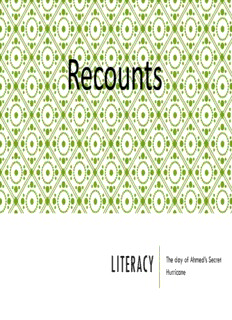
LITERACY The day of Ahmed's Secret Hurricane PDF
Preview LITERACY The day of Ahmed's Secret Hurricane
Recounts LITERACY The day of Ahmed’s Secret Hurricane Monday Can I recognise structure of story & how author keeps the reader guessing right to the end? Applying the principle. Read the whole Speculate book. Record the events of the recount. What is the power of becoming literate, Which tense is it written in? Is this usual for especially in places where schooling is not recounts? Change paragraph to past tense. free and universal? 2nd/ 3rdStorey learning 3rd Storey learning working with independence assessing the learning What might his secret be? When will it be told? Discuss in pairs, then regroup & record predictions. 2ndStorey learning deepening the understanding Look at the cover and title of The Day of Ahmed’s Secret. Discuss the effect the cov.er illustration & text have on reader. 1stStorey learning recapping / revising / introducing EXCERPT FROM THE DAY OF AHMED’S SECRET My special colours are part of the city, too. Woven into the harness of my donkey are my own good-luck ones, blue, green and gold. Hassan hands me a dish of beans and noodles and says, “And how goes the day of my friend the butagaz boy?” As I eat, Hassan and I laugh together at his jokes and stories. Always when I come home at sundown I tell his stories to my family, but tonight will be different. I will have my secret to tell them. I have been saving it until tonight. CHANGING TO PAST TENSE. Now someone else comes to Hassan’s cart and I wave goodbye. I must hurry now if I am to get all my work finished today. The first place I go is the home of the old woman. She has been waiting for me. “Ahmed! Ahmed!” she calls. “Are you bringing me the fuel for my stove?” The old woman is leaning out of her window. I look up and smile. I am proud that I can carry these big heavy bottles all the way up the steps to the floor where she lives. I am proud that I can do this work to help my family. Tuesday Can I re-write narrative recount in 3rd person? Write a short recount of Ahmed’s day in the third Volunteers read out your recount. person. Point out that they should use the past tense Listen carefully for perfect verbs, and the third person (he, him, his). You do not have to . raising your hand when you hear one. include all the events, but should write in paragraphs. Can you include any past perfect verbs? 2nd/ 3rdStorey learning 3rd Storey learning working with independence assessing the learning Discuss the use of the perfect form of verbs to mark relationships of time and cause. Try to use some perfect verbs in their recount of Ahmed’s day. 1stStorey learning Recapping/revising/introducing . What other features do recounts normally have? Look at Advanced recount book. 1stStorey learning recapping / revising / introducing THE PERFECT FORM OF VERBS The perfect form of a verb usually brings the reader’s attention to the consequences of a prior (previous) event; e.g. he has gone to deliver the bottles implies that he is still away (when we arrive), in contrast with he went to deliver the bottles (which happened sometime in the past before we arrive). Had gone to deliver the bottles takes a past time point (i.e. when we arrived) as its reference point and is another way of establishing time relations in a text. Form the perfect tense by: turning the verb into its past participle inflection, e.g. walked, taken (as opposed to its present participle, e.g. walking, taking); adding a form of the verb have before it. Further examples of the perfect form of verbs (which are present perfect and which are past perfect forms?): My father has described the old buildings to me. / My father had described the old buildings to me. Hassan has called to me in the street. / Hasan had called to me in the street. The sand had blown into the streets from the desert. / The sand has blown into the streets from the desert. The camels had crossed the desert many times. / The camels have crossed the desert many times. Ahmed has learnt how to write his name. / Ahmed had learnt how to write his name. SECOND EXCERPT FROM THE DAY OF AHMED’S SECRET I make more stops, and now I am hungry again. I look for the bright red and yellow cart where I can buy my lunch, and I find it in its usual place near the old building. I buy my beans and rice, and sit in the shade of the old wall. My father has told me the wall is a thousand years old, and even our great-great-grandfathers were not yet born when it was built. There are many old buildings, many old walls like the one I lean against, in this city. I close my eyes and have my quiet time, the time my father says I must have each day. “If there are no quiet spaces in your head, it fills with noise,” he has told me. He has shown me how to find my way in the city, and he has taken me to each place where I now have to bring the heavy bottles.
Description: